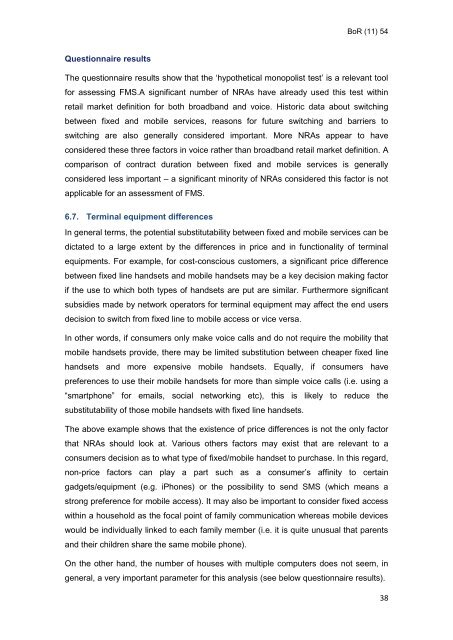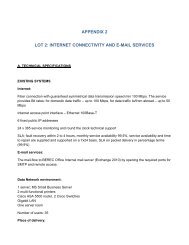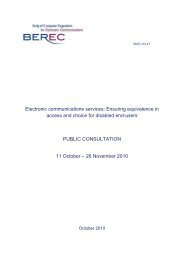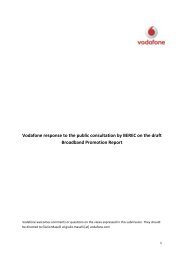BEREC REPORT ON IMPACT OF FIXED-MOBILE ... - berec - Europa
BEREC REPORT ON IMPACT OF FIXED-MOBILE ... - berec - Europa
BEREC REPORT ON IMPACT OF FIXED-MOBILE ... - berec - Europa
You also want an ePaper? Increase the reach of your titles
YUMPU automatically turns print PDFs into web optimized ePapers that Google loves.
Questionnaire results<br />
BoR (11) 54<br />
The questionnaire results show that the ‘hypothetical monopolist test’ is a relevant tool<br />
for assessing FMS.A significant number of NRAs have already used this test within<br />
retail market definition for both broadband and voice. Historic data about switching<br />
between fixed and mobile services, reasons for future switching and barriers to<br />
switching are also generally considered important. More NRAs appear to have<br />
considered these three factors in voice rather than broadband retail market definition. A<br />
comparison of contract duration between fixed and mobile services is generally<br />
considered less important – a significant minority of NRAs considered this factor is not<br />
applicable for an assessment of FMS.<br />
6.7. Terminal equipment differences<br />
In general terms, the potential substitutability between fixed and mobile services can be<br />
dictated to a large extent by the differences in price and in functionality of terminal<br />
equipments. For example, for cost-conscious customers, a significant price difference<br />
between fixed line handsets and mobile handsets may be a key decision making factor<br />
if the use to which both types of handsets are put are similar. Furthermore significant<br />
subsidies made by network operators for terminal equipment may affect the end users<br />
decision to switch from fixed line to mobile access or vice versa.<br />
In other words, if consumers only make voice calls and do not require the mobility that<br />
mobile handsets provide, there may be limited substitution between cheaper fixed line<br />
handsets and more expensive mobile handsets. Equally, if consumers have<br />
preferences to use their mobile handsets for more than simple voice calls (i.e. using a<br />
“smartphone” for emails, social networking etc), this is likely to reduce the<br />
substitutability of those mobile handsets with fixed line handsets.<br />
The above example shows that the existence of price differences is not the only factor<br />
that NRAs should look at. Various others factors may exist that are relevant to a<br />
consumers decision as to what type of fixed/mobile handset to purchase. In this regard,<br />
non-price factors can play a part such as a consumer’s affinity to certain<br />
gadgets/equipment (e.g. iPhones) or the possibility to send SMS (which means a<br />
strong preference for mobile access). It may also be important to consider fixed access<br />
within a household as the focal point of family communication whereas mobile devices<br />
would be individually linked to each family member (i.e. it is quite unusual that parents<br />
and their children share the same mobile phone).<br />
On the other hand, the number of houses with multiple computers does not seem, in<br />
general, a very important parameter for this analysis (see below questionnaire results).<br />
38





